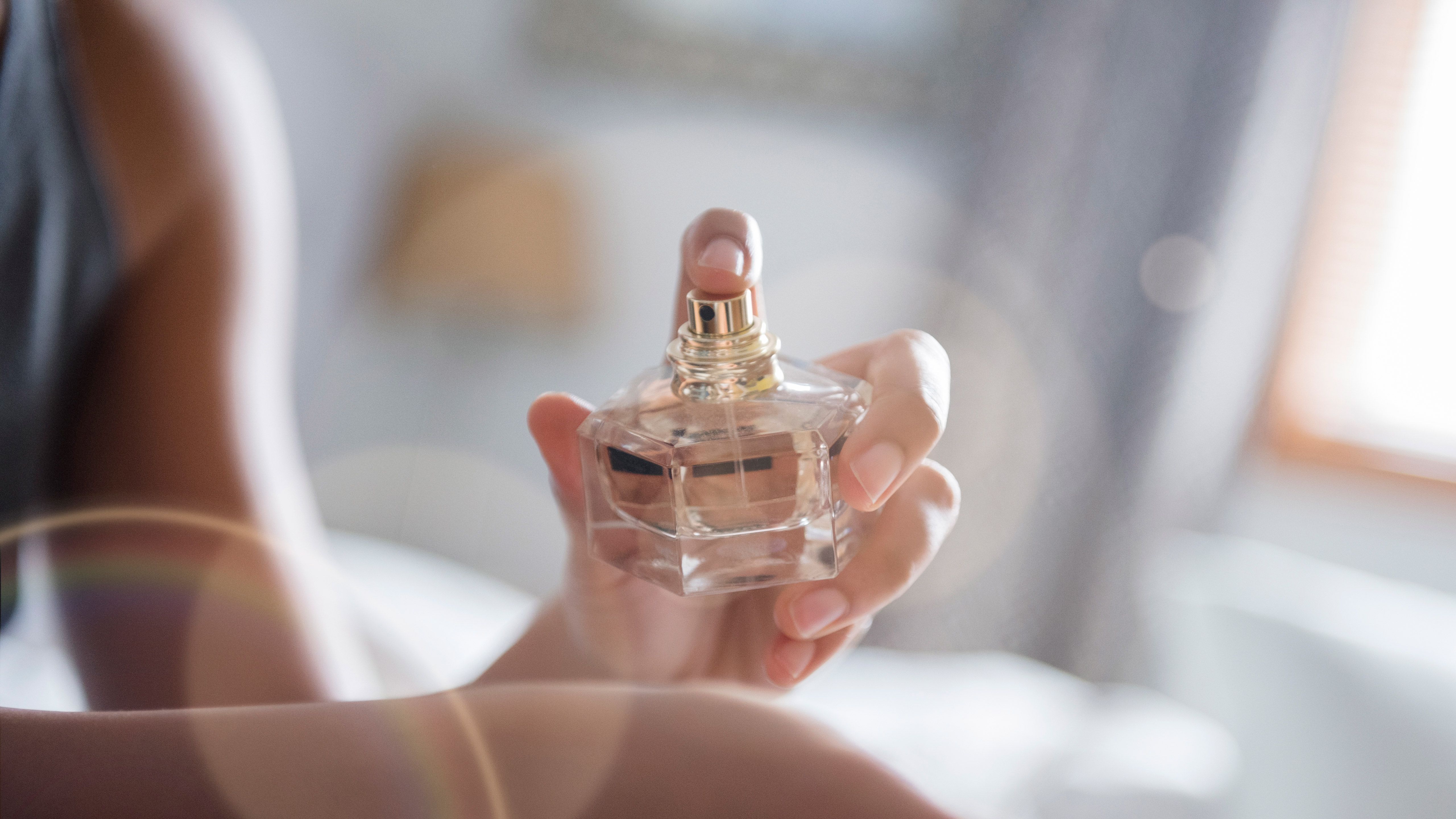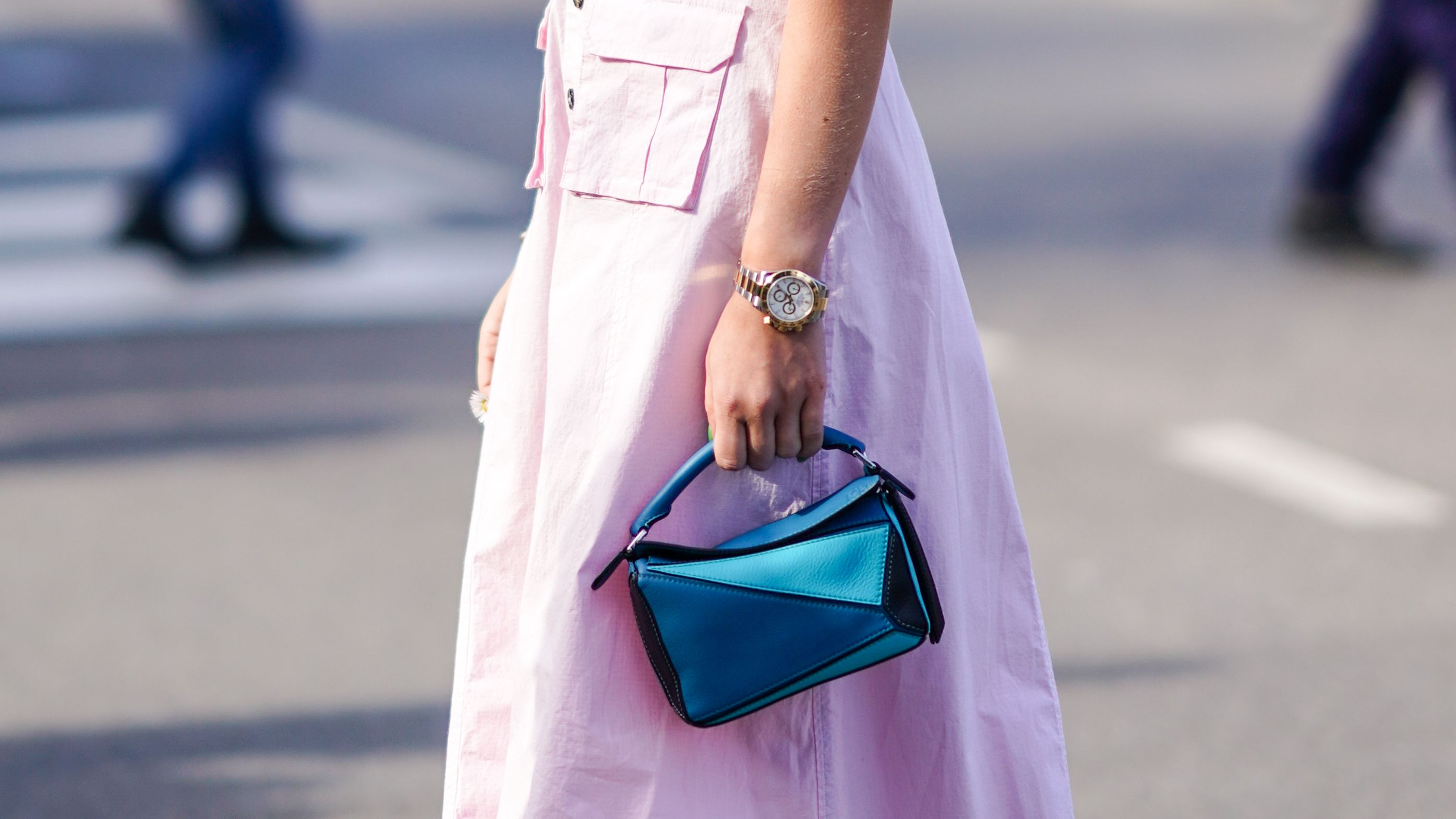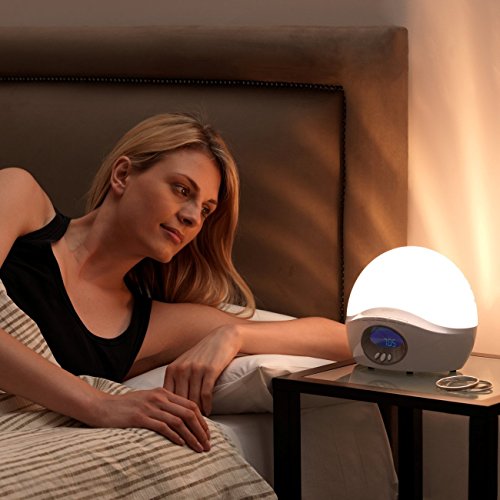This Is How to Sleep Better, According to Experts
A guide to really making the most of your time in the bedroom.
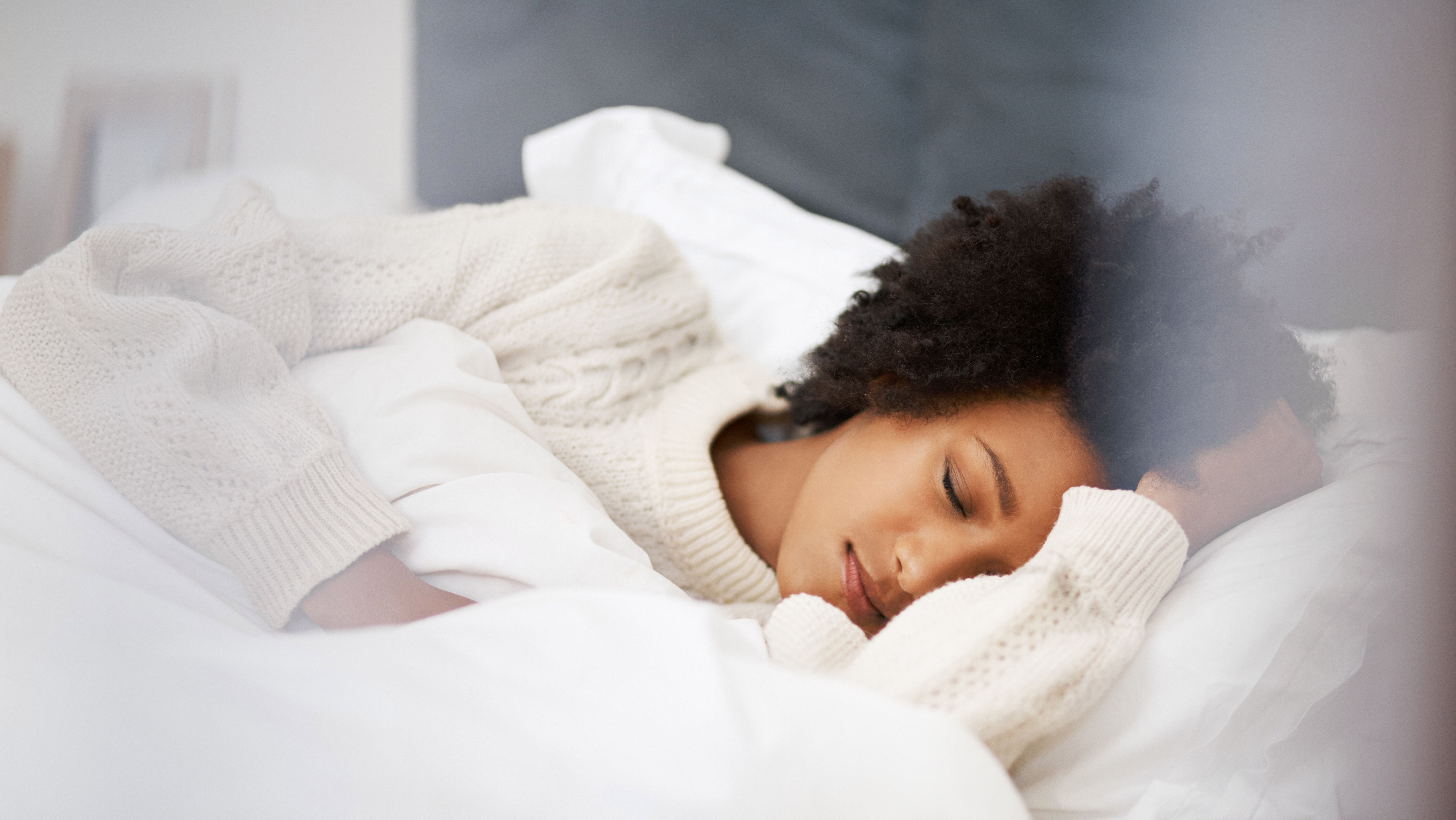
Nothing on this earth feels as great as a good night’s sleep. If you’re ever asked what “happiness” feels like, it feels like crawling into your bed after a long day and passing out. But as great—and important—as sleep is, it's also a luxury, and most of us just want more of it. Plus, we want to get the most out of our eight (or so) hours of sleep and wake up feeling energized.
Which is why the experts called me in: As a person who is somehow always tired, I know a thing or two about how to get to sleep, stay asleep, and wake up feeling bright-eyed. From one Tired Girl to another (or Tired Guy!), here’s how to maximize and enhance your entire sleeping experience.
(Real talk: if you’re having serious sleep issues and it's affecting your daily life, a few tricks here and there probably isn’t enough to fix the problem, and please look into seeing a sleep specialist.)
The Tired Girl's Guide To Sleeping Better
Don't shirk your housework.
Make your bed every day—and launder your sheets often. According to the National Sleep Foundation, seven out of ten people get a better night's sleep when sheets feel and smell fresh. By making your bed daily, you'll feel less inclined to get back into it.
Take your vitamins in the morning.
Certain types, like B12, can cause vivid dreams, which can wake you up. Other pills best popped in the morning include painkillers, which may contain caffeine, and some contraceptives, which may alter sleep patterns, says Kristen Binaso, a pharmacist in Clifton, New Jersey, and spokesperson for the American Pharmacists' Association.
Stay In The Know
Get exclusive access to fashion and beauty trends, hot-off-the-press celebrity news, and more.
Quit the afternoon coffee run.
Even if you swear you're able to doze after a venti latte, you're cheating yourself out of restorative deep sleep. And steer clear of snacks containing coffee, tea, or dark chocolate after 2 p.m. For a late-day boost, go for a 10-minute walk or reach for a high-protein snack like yogurt.
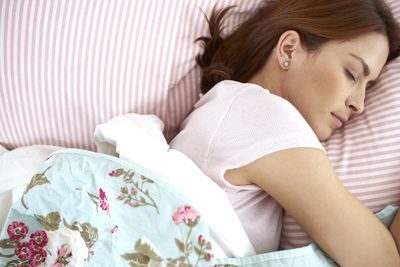
Nix naps if you find it hard to sleep at night.
And resist the urge to lie in bed in the morning after the alarm goes off. "The longer you go without sleep, the better your chances of falling asleep," says Jason Ong, Ph.D., assistant professor of behavioral sciences at Rush University in Chicago.
Ditch the smartphone.
And iPad. And laptop. Bedside gadgets make it more difficult to let go of the day and drift into sleep. "Any temptation to keep your brain stimulated is just going to make your brain think it should be awake," Ong said to the Financial Times. The bedroom is sacred. Everything from TV-watching to bill-paying is off-limits, except sleep and sex.
Practice letting go.
Too wired to sleep? Write down a to-do list and whatever else is stressing you out, then put it away. One of the best and easiest way to rid your mind of extra thoughts is to meditate. It doesn't have to be complicated: Another one of the simplest ways to get rid of your excess thoughts is to meditate before bed, if writing isn't your thing. You don't have to do anything complicated—try the Blue Energy method, or even download an app like Calm.
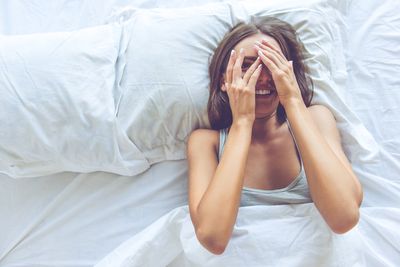
Hire a handyman.
And buy some earplugs. Any noise—a loud radiator, a leaky faucet—is a sleep nuisance, even if you're able to doze off to it. According to a 2010 Current Biology journal, the thalamus produces sleep spindles (brain activity that refreshes memory) to aid sleep in noisy environments. Some people produce more spindles naturally, but more research is needed to determine how others can boost their production.
Dim the lights at least an hour before hitting the pillow.
A bright room can block the production of melatonin (the hormone that makes us sleepy) and make you more alert. Once you're ready for bed, keep the room completely dark. If you can't keep away from your phone, find an app or a program that reduces blue light exposure and keeps your eyes from becoming strained, such as Night Shift in Apple products or f.lux for Android.
Avoid over-the-counter sleep drugs.
They often contain diphenhydramine, an allergy med that will make you drowsy but won't promote deep sleep. Plus, you'll wake up groggy and with a dry mouth.
Strike a pose.
Yoga may calm an over-aroused nervous system. When Harvard Medical School researchers prescribed a half hour of the Kundalini variety to insomniacs before bed for eight weeks, the subjects went from sleeping a mere 6.25 hours to a decent 7.3 hours.
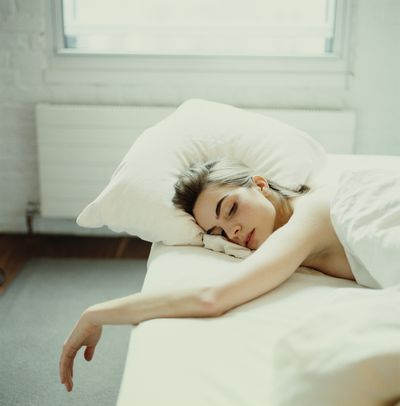
Keep cool.
Sleep experts suggest turning down the thermostat to between 60 and 68 degrees Fahrenheit for comfortable snoozing. Inspired by science that has found that cool temperatures promote sleep, two University of South Carolina women's basketball coaches invented Sheex, bedsheets that promise to transfer heat more efficiently and breathe better than cotton.
Spray the day away.
A nice-smelling room is always nice, but it even has great benefits for your sleep. Aromatherapy with scents like lavender and chamomile can really relax your body in time to get you in bed. Feel free to buy an air freshener, create your own blend of essential oils to dot onto your pressure points, or spray your pillow with this Deep Sleep Pillow Spray from This Works, which uses a clinically-tested blend of Lavender, Vetivert and Camomile to calm both mind and body, helping you to get to sleep quicker and wake up more rested.
The Tired Girl's Guide To Boosting Your Energy
Smell the coffee and wake up.
Literally. A Stevens Institute of Technology study reports that subjects exposed to the scent of coffee scored better on mental alertness tests than those exposed to no scent. It could be that a small amount of the volatile substance enters the bloodstream, or that the expectation of what coffee does for us primes the brain to act more awake. Sniffing a box of chocolates also makes us snap to attention. Subjects who sniffed it while working out ran faster, did more reps, and generally felt less tired, says the study.
Get some fresh air.
According to a University of Rochester study, being in nature boosts energy levels. "Nature is fuel for the soul," says author and psychology professor Richard Ryan, Ph.D. Even seeing nature in pictures gave subjects a surge.
Shine a light on it.
Alarms can be, well, alarming, and if you don't like being woken with a start, an alarm that uses ambient light might be exactly what you need. Light is natural and gradual, and you may feel more alert waking up to the sunrise naturally or with an ambient light alarm. You can find one in the form of software, or a Lumie Bodyclock alarm.
Breathe aggressively.
Deep, meditative breaths will calm, but if it's a quick boost you're looking for, try what Kundalini yogis call "breath of fire": Sit with arms stretched upward and mouth closed, inhale through your nose as your navel moves outward, then exhale through your nose as you pull your navel inward. Repeat quickly and vigorously, keeping your body still, except for your navel, for one minute. While it's unclear why the exercise is so stimulating, scientists believe it could be that it works out the respiratory muscles.
Eat complex carbs.
Any carbohydrate will break into glucose and provide energy to the brain, but high-fiber choices like whole-grain crackers or fruit will provide a sustained energy source without the crash you get from junk food. Even better: Add almonds, which contain a high level of blood-flow-enhancing arginine.
For more stories like this, including celebrity news, beauty and fashion advice, savvy political commentary, and fascinating features, sign up for the Marie Claire newsletter.
RELATED STORIES
